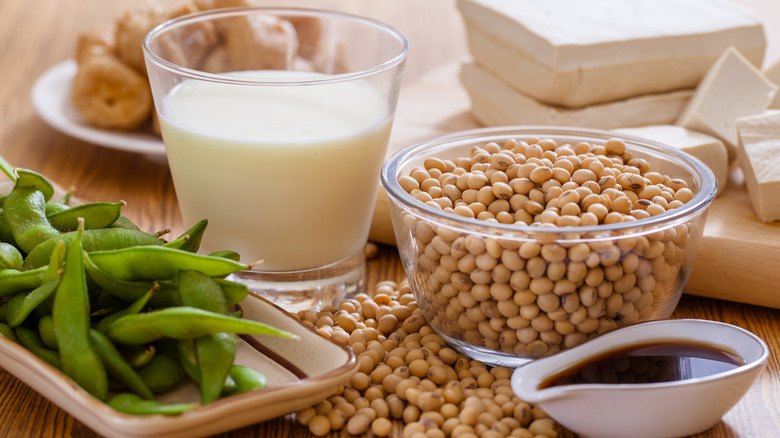Eating Soy Has An Unexpected Effect On A Man's Prostate
Soy milk moved from health food stores to mainstream grocery stores in the 1990s, when research showed that soy protein could improve your cholesterol levels. In fact, the Food and Drug Administration lets soy food manufacturers label their products as heart-healthy. Soy quickly became a superfood — until it just as quickly fell from grace. Because the isoflavones in soy act like estrogen, men feared soy would rob them of their masculinity. Others worried that soy would affect the endocrine systems of young girls and cause cancer. However, cancer nutritionists say these are myths. Soy works differently in premenopausal and postmenopausal women, and soy acts differently with certain types of breast cancer.
The genistein and daidzein in soy's isoflavones have anti-cancer properties. Soy foods such as soy flour, soy protein isolate, tempeh, and miso have the highest amount of total isoflavones per 100 grams. According to a 2013 review in BJU International, soy products reduced the risk of prostate cancer in men who were at high risk.
Soy's effects on cancer
Soy can also supplement radiation therapy in treating prostate cancer by reducing side effects. A 2010 study in Nutrition and Cancer had one group of prostate cancer patients take 200 milligrams of soy isoflavone a day while another took a placebo. After six months, the group that took the soy isoflavones had less urine leakage, less diarrhea, and less bowel-related pain. Taking soy was also more likely to enable erections.
When your body breaks down the isoflavones in soy, they're more easily absorbed and processed by the liver, according to a 2017 review in Nutrients. Because these isoflavones act like estrogen, they bind to an estrogen receptor in prostate tissue to reduce cancer growth and lower proteins that factor into the development of prostate cancer.
A 2022 review in Frontiers in Nutrition found that soy can also reduce the risk of other cancers by 10%. You can reduce your risk of cancer by 4% for each 25 grams of soy or 10 grams of soy isoflavones you consume per day. Although your risk of prostate cancer drops by 12% by eating soy, you can lower your risk of lung cancer by 33%. Soy or soy isoflavones aren't associated with lowering your risk of dying of cancer.
Other ways to prevent prostate cancer
If you're still a little nervous about soy (or if you just don't like soy milk or tofu), Johns Hopkins Medicine has some suggestions to reduce your risk of prostate cancer. A diet high in healthy omega-3 fats from salmon or nuts will improve your immune and endocrine systems while reducing inflammation. You can boost your prostate health by eating foods like tomatoes and cruciferous vegetables. You'll also want to cut back on foods high in saturated fats like lamb chops, processed meats, and butter. Be careful not to cook your meat at extremely high temperatures because the meat will produce chemicals that can cause cancer (per the National Cancer Institute).
Reducing your risk of cancer also involves moving more. Exercise supports your immune system and helps to keep your weight down. Although obesity doesn't cause prostate cancer, you're more likely to develop a more advanced form of breast cancer with more weight on your frame (per WebMD). If you've already had prostate cancer, gaining weight increases your risk of developing prostate cancer again. You can also lower your cancer risk by cutting back on alcohol and cigarettes.



